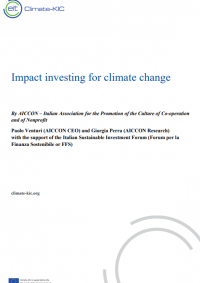Impact investing for climate change
Paolo Venturi (AICCON CEO) and Giorgia Perra (AICCON Research) with the support of the Italian Sustainable Investment Forum (Forum per la Finanza Sostenibile or FFS)
Some years ago, the big issue of climate change seemed a dissertation topic for top-end scientists that, at time, could be perceived as catastrophist, just as directors of apocalyptic films. Since then, the climate situation has been worsening, but, concomitantly, the strategies and work aimed at curbing and reversing this phenomenon have been growing at the same pace. Today, however, private citizens, political citizens and/or entrepreneurs/investors can contribute, with their behaviours and their business and financial strategies, to an actual turning point and to deeply transforming the economic model of growth and development. This awareness has considerably developed in Italy, where – according to a survey carried out by Schroders in 2017 – the majority of respondents adopt behaviours aimed at contributing to a shift towards a more sustainable society: 79% is careful about waste reduction and separate collection, 63% buys local products, 60% takes account of his/her ecological footprint in making decisions on mobility and home energy consumption [Schroders, 2017].
As maintained in a report recently issued by the Organization for Economic Co-operation and Development [OECD, 2017], policies on climate changes are key for development and growth, as are structural reforms and environmental investments. The combination of these three elements is crucial to promote inclusive and sustainable growth, contributing to the increase in market competition and fostering access to employment and the improvement in people’s skills.
Therefore, along with policy makers, the finance sector can give – and is giving – a considerable contribution. Finance that protects the environment and supports the social fabric could necessarily become the finance of the future and, maybe, also of the present. In the wake of the Paris Agreement, the concern for climate changes has become a driver, new “green” financial products have started to be used and climate bonds continued to be in high demand. Finally, pension funds from all over the world are demonstrating that they consider sustainable investments as critical factors for long-term investments and are increasingly asking for their investment to be supplemented with environmental, social and governance (ESG) elements. Evidence of this is the first report on ethical and sustainable finance in Europe, which has estimated that this sector accounts for a total of Euro 715 billion worth of assets, close to 5% of the EU gross domestic product.
However, even though finance plays a key role in addressing climate changes, most players involved are less than transparent in reporting the impact of their investments. This is the reason why this document focuses on impact finance, which includes investing in businesses, organizations and funds that operate with the goal of achieving a measurable, positive social impact alongside and a financial return [Social Impact Investing Task Force, 2015]. Impact investing stands out for the investor’s express intention to generate social and/or environmental impacts; moreover, the investor must be motivated by an expected financial return. The flexibility of the expected rate of return may come below the average market level or in line with it. Therefore, very briefly, we are speaking of external investors that invest capital, which is remunerated based of the measurement of the generated impact.
Impact finance is becoming more and more important in Europe, as stated in the recent interim report published in July 2017 by the European High Level Expert Group on sustainable finance, during the international “One Planet Summit” on 12 December. In Italy, the interest in this topic is also growing: participation in the G8 Social Impact Investment Force (2014) and the creation of the Social Impact Agenda (2016) are two big steps in this direction. Moreover, institutional investors and banks are paying constant attention to this topic. As regard the climate change challenge, a lot still needs to be done in terms of impact investing tools and supporting metrics, both at a domestic and at a European level. The report gives an overview of the metrics and indicators used, along with some significant cases.

